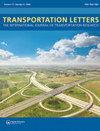单向混合车队汽车共享系统中优化车队、员工配置和运营策略:基于拉格朗日松弛的方法
IF 3.3
3区 工程技术
Q2 TRANSPORTATION
Transportation Letters-The International Journal of Transportation Research
Pub Date : 2025-07-03
DOI:10.1080/19427867.2024.2407184
引用次数: 0
摘要
本研究探讨通过将汽油车和电动车整合成一个单向混合车队汽车共享系统(OMFCS)来增强汽车共享服务。重点是优化配置(车队和员工规模、初始部署)和运营策略(车辆搬迁和员工再平衡),同时考虑碳排放成本。采用时空电网络建模方法,建立了一个整数线性规划模型来解决配置和运行策略优化问题。为了求解该模型,我们引入了一种集子梯度、动态规划和基于贪婪的启发式算法于一体的拉格朗日松弛分支界方法。通过实例和实际案例验证了所提出的求解方法的有效性,并对OMFCS的结构和运行策略进行了分析。敏感性分析结果表明,OMFCS比仅使用一种类型车辆的汽车共享系统更有利可图,并且更好地平衡了用户服务质量和碳排放。本文章由计算机程序翻译,如有差异,请以英文原文为准。
Optimizing fleet, staff configuration and operational strategies in one-way mixed fleet carsharing systems: a Lagrangian relaxation-based approach
This study explores enhancing carsharing services by integrating gasoline and electric vehicles into a one-way mixed fleet carsharing system (OMFCS). The focus is on optimizing configurations (fleet and staff size, initial deployment) and operational strategies (vehicle relocation and staff rebalancing) while considering carbon emission costs. Employing a space-time-electricity network modeling approach, we developed an integer linear programming model to tackle the configurations and operational strategies optimization problem. For solving this model, we introduce a Lagrangian relaxation-branch bound approach, which integrates subgradient, dynamic programming and greedy-based heuristics algorithm. An illustrative case and a real-world case are conducted to demonstrate the efficiency of the proposed solution method and the analysis sheds light on the configurations and operational strategies of OMFCS. The sensitive analysis results suggest that OMFCS is more profitable and balances user service quality and carbon emissions better than carsharing systems using only one type of vehicle.
求助全文
通过发布文献求助,成功后即可免费获取论文全文。
去求助
来源期刊

Transportation Letters-The International Journal of Transportation Research
TRANSPORTATION SCIENCE & TECHNOLOGY-
CiteScore
6.40
自引率
14.30%
发文量
79
审稿时长
>12 weeks
期刊介绍:
Transportation Letters: The International Journal of Transportation Research is a quarterly journal that publishes high-quality peer-reviewed and mini-review papers as well as technical notes and book reviews on the state-of-the-art in transportation research.
The focus of Transportation Letters is on analytical and empirical findings, methodological papers, and theoretical and conceptual insights across all areas of research. Review resource papers that merge descriptions of the state-of-the-art with innovative and new methodological, theoretical, and conceptual insights spanning all areas of transportation research are invited and of particular interest.
 求助内容:
求助内容: 应助结果提醒方式:
应助结果提醒方式:


